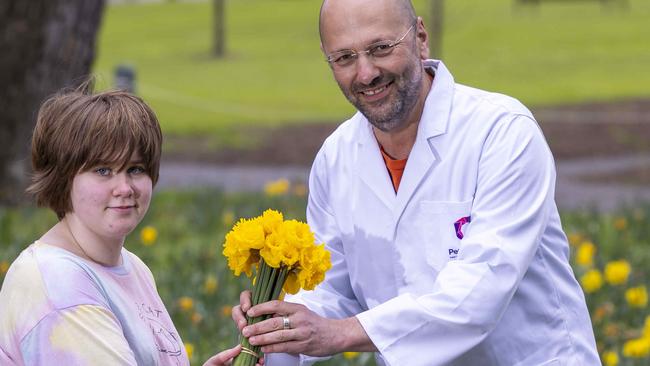Peter Mac team solving blood cancer mystery, a step at a time
An emerging, promising blood cancer treatment that uses a patient’s own immune system to seek out and destroy cancer cells has researchers elated but baffled.
Victoria
Don't miss out on the headlines from Victoria. Followed categories will be added to My News.
An emerging blood cancer treatment that holds the potential of a cure has Victorian researchers both elated, and baffled.
CAR T-cell therapy, or Chimeric Antigen Receptor, is, says Peter MacCallum Cancer Centre researcher Ilia Voskoboinik, an exciting immunotherapy. It uses a patient’s own immune system to seek out and destroy cancer cells.
Budding pediatric doctor Rosemary Talbot, 12, has high hopes this immunotherapy can cure cancer.
She wrote to Cancer Council Victoria recently to suggest a tiny robot could be programmed to tell the difference between a non-cancerous cell and a cancerous cell and then deliver a killer blow.
Rosemary was, says Cancer Council Victoria, describing the role of immotherapies like CAR T-cells.
Associate Professor Voskoboinik, who met with Rosemary to talk about the science behind it, says while it works well in some blood cancer patients, in others CAR T-cell therapies are less effective.

He is investigating why in many patients their immune system responds to the treatment too much sending it into overdrive which can cause a potentially serious side effect called Cytokine Release Syndrome (CRS).
Associate Professor Voskoboinik is leading a team at the Peter Mac working to develop personalised therapies that overcome blood cancer resistance, predict those patients where CAR T-cell therapy will be ineffective and modify treatment so that there are fewer side effects.
The groundbreaking research is partially funded by Cancer Council Victoria.
The team, which also includes Professor Joseph Trapani at the Peter Mac and Professor Constantine Tam at Alfred Health, has already found different levels of resistance of cancer cells to CAR T-cells.
“By conducting this research we can identify whether a patient’s blood cancer cells can be killed by CAR-T cells and, if not, we may try and arm them so they can defeat cancer,” Assoc Professor Voskoboinik said.

“We are looking for the missing pieces of the puzzle,” he said.
The goal, he said was to generate CAR T-cells that will have minimal side effects without compromising their capacity to kill cancer cells.
“If we get there I will be very happy,” he said.
Assoc Professor Voskoboinik says the team has “gone back to basics” to better understand how this immunotherapy works in blood cancers such as leukaemia, lymphoma and myeloma.
“For many patients with hard-to-treat blood cancers, and who have relapsed or not responded to earlier treatments, CAR T-cell therapy can lead to prolonged remission and be an effective cure,” he said.
“However, for a subset of these patients that we cannot yet predict, CAR T-cell therapy will be ineffective, and we don’t fully know why.”
“The way it works it was expected that these CAR T-cells that recognise a very specific molecule on the surface of blood cells would work uniformly well for every blood cancer, but it doesn’t. That’s what we need to work out.”
He added that without funding from Cancer Council Victoria the project wouldn’t have achieved key milestones.
And without inquisitive minds like Rosemary, immunotherapy may have remained just a good idea
Cancer Council Victoria’s Chief Executive Officer Todd Harper said Cancer Council and its research partners had invested more than $290 million in world-class cancer research, making it the largest independent funder of cancer research in the country.
To help its work, support Daffodil Day today by donating or buying daffodils at www.daffodilday.com.au or phone 1300 65 65 85, or host a fundraiser.





